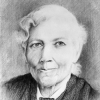Harriet Ann Jacobs

Harriet Ann Jacobs
Harriet Ann Jacobswas an African-American writer who escaped from slavery and was later freed. She became an abolitionist speaker and reformer. Jacobs wrote an autobiographical novel, Incidents in the Life of a Slave Girl, first serialized in a newspaper and published as a book in 1861 under the pseudonym Linda Brent. It was a reworking of the genres of slave narrative and sentimental novel, and was one of the first books to address the struggle for freedom by female slaves,...
NationalityAmerican
ProfessionWriter
CountryUnited States of America
The slave child had no thought for the morrow; but there came that blight, which too surely waits on every human being born to be a chattel.
Could you have seen that mother clinging to her child, when they fastened the irons upon his wrists; could you have heard her heart-rending groans, and seen her bloodshot eyes wander wildly from face to face, vainly pleading for mercy; could you have witnessed that scene as I saw it, you would exclaim, Slavery is damnable!
If a slave is unwilling to go with his new master, he is whipped, or locked up in jail, until he consents to go, and promises not to run away during the year.
If you want to be fully convinced of the abominations of slavery, go on a southern plantation, and call yourself a negro trader. Then there will be no concealment; and you will see and hear things that will seem to you impossible among human beings with immortal souls.
Lives that flash in sunshine, and lives that are born in tears, receive their hue from circumstances.
When my babe was born, they said it was premature. It weighed only four pounds; but God let it live.
There is a great difference between Christianity and religion at the south. If a man goes to the communion table, and pays money into the treasury of the church, no matter if it be the price of blood, he is called religious.
When I was nearly twelve years old, my kind mistress sickened and died.
When I was six years old, my mother died; and then, for the first time, I learned, by the talk around me, that I was a slave.
There must be sophistry in all this; but the condition of a slave confuses all principles of morality, and, in fact, renders the practice of them impossible.
My master had power and law on his side; I had a determined will. There is might in each.
Notwithstanding my grandmother's long and faithful service to her owners, not one of her children escaped the auction block. These God-breathing machines are no more, in the sight of their masters, than the cotton they plant, or the horses they tend.
There is something akin to freedom in having a lover who has no control over you, except that which he gains by kindness and attachment.
No pen can give an adequate description of the all-pervading corruption produced by slavery.